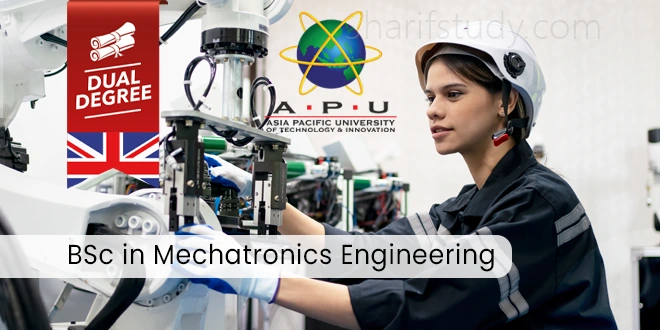APU BSc in Mechatronics Engineering is a branch of engineering that combines various disciplines such as: mechanical, electrical, computer, and robotics engineering to connect independent stages of design and production processes into one effective system.
The term “mechanical engineering” was first used in the late 1960s as a combination of the terms “mechanical engineering” and “electronics,” but it has since changed and grown. Modern mechatronics can include elements of artificial intelligence, cybersecurity, telecommunications, optical engineering, systems and controls, and other subjects in addition to those stated above.
Program Outline
APU BSc in Mechatronics Engineering is specifically designed to teach students :
- High-quality undergraduate engineering education by providing students with a curriculum that is firmly grounded in Mechatronic engineering fundamentals.
- A study of basic engineering sciences and fundamentals of mechanical, electrical, electronics and computer engineering. Students will be able to integrate these four disciplines.
- The technical skills to design, analyze and test “intelligent” products or processes that incorporate suitable controller, sensor and mechatronic devices for robotics and automation.
Degree Level 1
In year 1, Students will understand the fundamental engineering principles of circuit analysis, engineering materials, instrumentation and measurement, and engineering design. Other programs aim to give the fundamental academic abilities needed to satisfy the demands of employers, as well as a strong background in IT and entrepreneurship concepts.
Common Courses
- Analysis of Circuits
- Instrumentation & Measurement
- Fundamentals of Entrepreneurship
- Engineering Mathematics 1
- Engineering Mathematics 2
- Introduction to C Programming
- Programming with Python
- Engineering Materials
- Engineering Design
- Engineering Statics & Dynamics
Degree Level 2
In year 2, Students begin to focus on courses that grow the necessary fundamental knowledge and skills in Mechatronic Engineering at this level, including Analogue Electronics, Digital Electronics, Introduction to Electrical Systems, Electromagnetic Field Theory, Engineering Software & Applications, Signals and Linear Systems, Strength of Materials, Robotics Technology, and Sensor & Actuators.
Common Courses
- Analogue Electronics
- Digital Electronics
- Introduction to Electrical Systems
- Engineering Mathematics 3
- Electromagnetic Field Theory
- Engineering Software & Applications
- Signals and Linear Systems
- Innovation Process
Specialized Courses
- Strength of Material
- Robotics Technology
- Sensors & Actuators
Internship
To bridge the gap between academic and professional worlds, students will experience an Internship or Industrial Training for at least 16 weeks. This ensures they transition smoothly from academic settings to real world job.
Degree Level 3
In year 3, The main focus is on specialized knowledge and abilities in the areas of Control Engineering, Communication Engineering Principles, Microprocessor Systems & Embedded Software, Machine Design, Fluid Mechanics, Industrial Automation, and Machine Vision & Intelligence.
Common Courses
- Control Engineering
- Communication Engineering Principles
- Microprocessor Systems & Embedded Software
- Engineering Project Management
- Engineering Mathematics 4
- Venture Building
Specialized Courses
- Machine Design
- Fluid Mechanics
- Industrial Automation
- Machine Vision & Intelligence
Elective Courses (Choose 1)
- Digital Signal Processing
- Power Electronics & Drives
Degree Level 4
In year 4, The final year Engineering programs provide the necessary industry practical and technological abilities for employment after graduation. Personal and professional development, technical capability, and understanding of how to create, originate, and manage the generation of new ideas will all be improved for students. Students will complete a number of Engineering Projects in which they can demonstrate strong critical thinking, analysis, and solution developing skills.
Common Courses
- Project Phase 1 (Investigation)
- Project Phase 2 (Implementation)
- Group Design Project
- Engineer in Society
Specialized Courses
- CAD/ CAM
- Thermodynamics & Heat Transfer
- Product Creation Technology
Elective Courses (Choose 1)
- Internet of Things: Concepts & Applications
- Robot Navigation & Mapping with ROS
MQA Compulsory Subjects
- Appreciation of Ethics and Civilization (Malaysian Students)
- Malay Communication Language (International Students)
- Philosophy and Current Issues
- Workplace Professional Skills
- Integrity and Anti-corruption
- Co-Curriculum
APU-DMU Dual Degree
Students enrolled in the Bachelor’s Degree Program are presented with the opportunity to join the APU-DMU Dual Degree Scheme. By choosing this pathway, upon graduation, students will be awarded two Degree Certificates & Transcripts: one from Asia Pacific University (APU) in Malaysia and another from De Montfort University (DMU) in the UK.
| Duration | Intakes |
| 4 Years (8 Semesters) |
14 Mar 2024 | 25 Jul 2024 24 Sep 2024 | 21 Nov 2024 |
Admission Requirements
| General Requirements | |
| Direct Entry to Level 1 of Degree | |
| STPM | • 2 Passes in STPM with a minimum Grade C+ (GP 2.0) and a Credit in Mathematics at SPM Level or its equivalent. (MUET Band 2 is required for all Malaysian Students) |
| A-Level | • 2 Passes in A-Level in any 2 subjects, and a Credit in Mathematics at SPM/O-Level/IGCSE or its equivalent. |
| UEC | • 5 Grade B’s in UEC including Mathematics. (MUET Band 2 is required for all Malaysian Students) |
| Foundation/ Matriculation | • Passed Foundation program (minimum CGPA of 2.0) with a Credit in Mathematics at SPM/O-Level/IGCSE or equivalent. |
| Direct Entry to Level 2 of Degree | |
| Diploma in Accounting | • Passed Diploma with minimum CGPA of 2.0 and a Credit in Mathematics at SPM/O-Level/IGCSE level. |
English Requirements for International Students
- IELTS : 5.0
- TOEFL iBT : 40
- Pearson (PTE) : 47
- MUET : Band 3.5
Career Options
- Automation Engineer
- Mechatronic Engineer
- Mechanical Engineer
- Service Engineer
- QA/QC Engineer
- Sales Engineer
- Support Engineer
- R&D Engineer
- Manufacturing Engineer
- IoT Engineer
- Robotics Engineer
- Plant Engineer
- Design Engineer
Course Fees
| Malaysian Students | International Students |
| Year 1: RM 26,200 | Year 1: RM 29,800 (USD 7,270) |
| Year 2: RM 26,600 | Year 2: RM 30,200 (USD 7,365) |
| Year 3: RM 26,600 | Year 3: RM 30,800 (USD 7,510) |
| Year 4: RM 27,600 | Year 4: RM 31,200 (USD 7,610) |
| Total: RM 107,400 | Total: RM 122,000 (USD 29,755) |
 SharifStudy Best way to Study in Malaysia
SharifStudy Best way to Study in Malaysia




